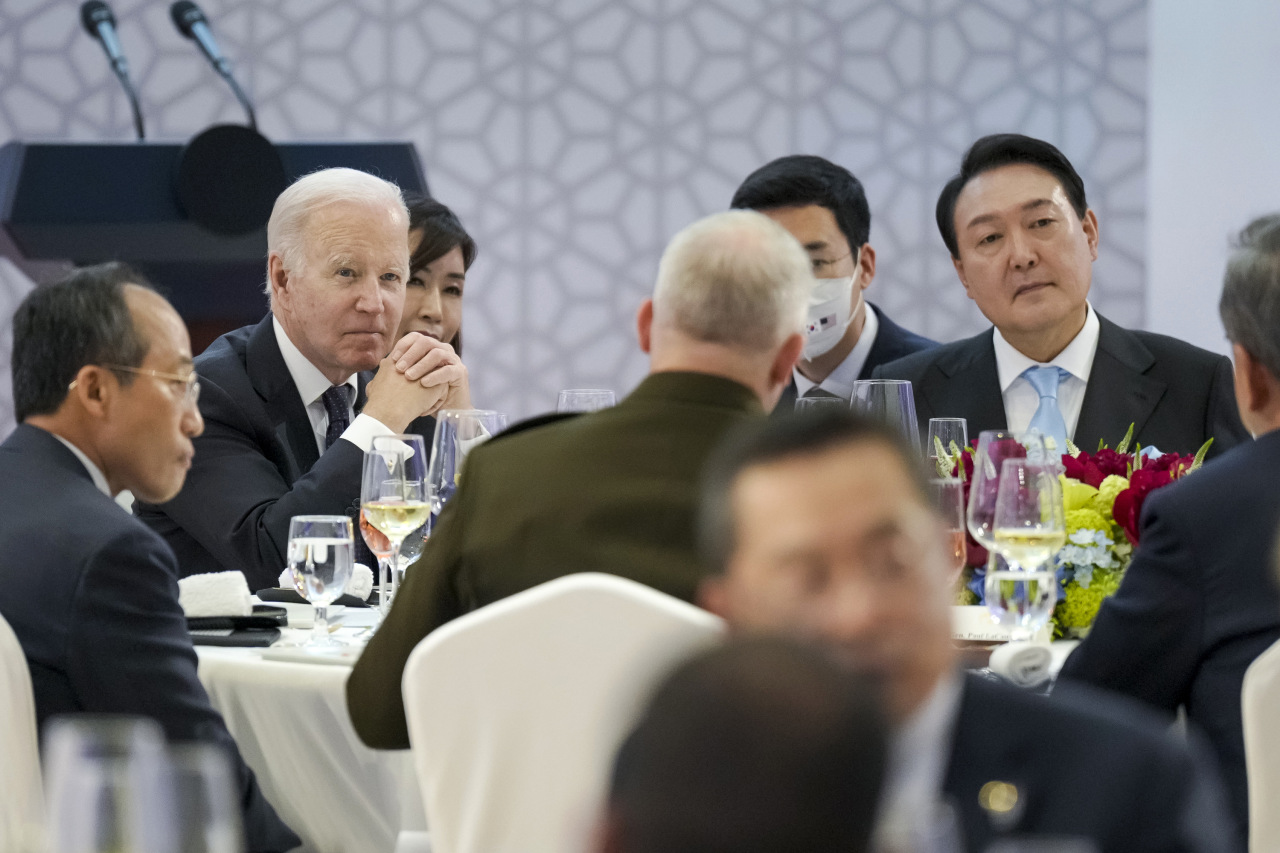US says it supports nuclear-free peninsula amid dispute over tactical nuke redeployment
By Ji Da-gyumPublished : Oct. 12, 2022 - 16:02

North Korea’s pronouncement that the recent flurry of ballistic missile launches aimed to simulate striking South Korea with tactical nuclear weapons has generated a whirlwind of discussions on South Korea’s military countermeasures.
The redeployment of US tactical nuclear weapons on the Korean Peninsula takes center stage in South Korea amid ongoing internal wrangling over how to address North Korea’s development of tactical nuclear weapons that are intended for use by troops on the battlefield.
But the White House said it still supports a nuclear-free Korean Peninsula while avoiding directly commenting on the internal debate over the redeployment in South Korea.
“Our goal is the complete, verifiable denuclearization of the Korean Peninsula, and we believe that there’s still a diplomatic path forward to this, White House National Security Council spokesperson John Kirby said during a press briefing when asked about the US position on the redeployment.
Echoing the view, the US State Department reiterated the US’ existing extended deterrence commitment to South Korea when asked about the debate within South Korea on whether to request the US to redeploy tactical nuclear weapons.
“We have placed a premium on doing everything we can to ensure that our commitments to defense and to deterrence when it comes to our treaty allies, including the ROK in this case, remain ironclad,” State Department spokesperson Ned Price said Tuesday during a regular news briefing.
“President Biden affirmed that US extended deterrence commitment to the ROK -- he confirmed that commitment to the ROK -- using the full range of US defense capabilities, including nuclear, conventional, and missile defense capabilities.”
Price also underscored that Seoul and Washington have reactivted the high-level Extended Deterrence Strategy and Consultation Group in September and “committed to further strengthen deterrence by reinforcing the combined defense posture.”
Extended deterrence is the US commitment to deter or respond to coercion and attacks on US allies and partners. The US nuclear umbrella is one means the US offers to achieve extended deterrence.
Debate on the potential redeployment of US tactical weapons on the Korean Peninsula has recently reemerged as North Korean state media on Monday said the country’s “tactical nuclear operation units” conducted live-fire drills seven times between Sept. 25 and Oct. 9.
North Korea fired a total of 12 ballistic missiles in seven discrete launches during the period. North Korean media said the launches of dual-capable missiles aimed to simulate striking main targets in South Korean territory with tactical nuclear weapons.
In addition, South Korean President Yoon Suk-yeol’s statement on the redeployment of tactical nuclear weapons adds fuel to the debate within the country.
Yoon said Tuesday that he is “weighing (the option) while listening attentively to various options from the South Korean and US governments and the public” when asked about the emerging debate on the redeployment. But Yoon elucidated that this is not a matter of publicly expressing his opinion.
Yoon’s remarks -- who seems to have struck a different tone from his previous statements -- have raised questions about whether the Yoon government has shifted its stance on the issue.
Yoon publicly ruled out the possibility of the redeplyoment of US tactical nuclear weapons in an interview with CNN this May. The president also said he believes the Treaty on the Nonproliferation of Nuclear Weapons, or NPT, is “very important and an essential prerequisite to build the world of lasting peace,” reiterating that his priority would be to enhance the viability of the US extended deterrence.
A local media report further ignited the heated discussion on the matter. Daily newspaper Financial News on Tuesday reported that the presidential office offered the ruling People Power Party support to create an environment conducive to pushing for the redeployment of the US tactical nuclear weapons a month ago, citing unnamed government sources.
In response, the South Korean presidential office clarified that “there had been no discussion with the ruling party concerning the redeployment of tactical nuclear weapons.”
Amid the heated debate, members of the main opposition Democratic Party of Korea have voiced their opposition to the redeployment.
Rep. Kim Byung-joo of the Democratic Party of Korea said the South Korean government will “lose legitimacy in terms of pursuing denuclearization of North Korea,” dismissing the feasibility of the option. The redeployment of the US tactical nuclear weapons will lead to the consequence of recognizing North Korea's status as a nuclear weapons state.
But Rep. Kim Gi-hyeon of the People Power Party, who announced his bid for the party’s chairmanship, said Wednesday that “South Korea should move toward nuclear armament” in a radio interview, reiterating the importance of independent defense capabilities against North Korean threats.
Ruling party leader Chung Jin-suk called for abrogating a 1991 inter-Korean declaration on denuclearization, should North Korea go ahead with a seventh nuclear test.
The US deployed tactical nuclear weapons, or nonstrategic nuclear weapons, on the Korean Peninsula between 1958 and 1991. In December 1991, the two Koreas signed the Declaration on the Denuclearization of the Korean Peninsula, pledging not to produce, possess, store, deploy or use nuclear weapons.












![[Today’s K-pop] BTS pop-up event to come to Seoul](http://res.heraldm.com/phpwas/restmb_idxmake.php?idx=644&simg=/content/image/2024/04/17/20240417050734_0.jpg&u=)





![[KH Explains] Hyundai's full hybrid edge to pay off amid slow transition to pure EVs](http://res.heraldm.com/phpwas/restmb_idxmake.php?idx=652&simg=/content/image/2024/04/18/20240418050645_0.jpg&u=20240419100350)

